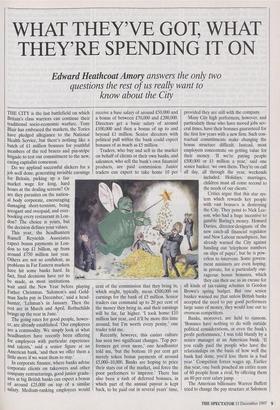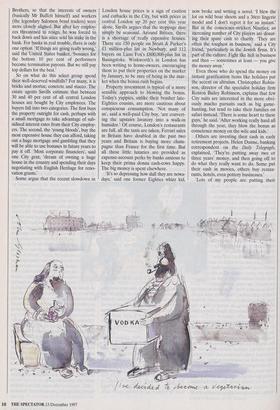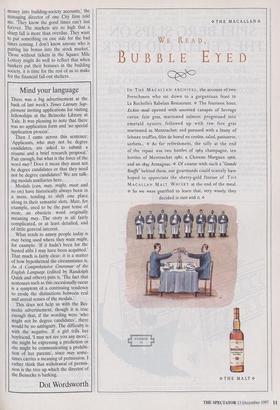WHAT THEY'VE GOT, WHAT THEY'RE SPENDING IT ON
Edward Heathcoat Amory answers the only two
questions the rest of us really want to know about the City
THE CITY is the last battlefield on which Britain's class warriors can continue their traditional socio-economic warfare. Tony Blair has embraced the markets, the Tories have pledged allegiance to the National Health Service, but there's nothing like a batch of £1 million bonuses for youthful members of the red braces and pin-stripe brigade to test our commitment to the new, caring capitalist consensus. Do we applaud successful slickers for a job well done, generating invisible earnings for Britain, picking up a fair market wage for long, hard hours at the dealing screens? Or are they parasites on the nation- al body corporate, encouraging damaging short-termism, being arrogant and overpaid, and over- booking every restaurant in Lon- don? The choice is yours, but the decision defines your values.
This year, the headhunters Russell Reynolds Associates expect bonus payments in Lon- don to top £1 billion, up from around £750 million last year. Others are not so confident, as problems in Far Eastern markets have hit some banks hard. In fact, final decisions have yet to be made, as most institutions wait until the New Year before playing Father Christmas. 'Salomon's and Gold- man Sachs pay in December,' said a head- hunter, 'Lehman's in January. Then the rest are in March and April. Rothschilds brings up the rear in June.'
The going rates for good people, howev- er, are already established. 'Our employees are a commodity. We simply look at what headhunters have recently been offering for employees with particular experience and talents,' said a senior figure at an American bank, 'and then we offer them a little more if we want them to stay.'
In corporate finance, where banks advise corporate clients on takeovers and other company restructurings, good junior gradu- ates at big British banks can expect a bonus of around £25,000 on top of a similar salary. Medium-ranking employees would receive a base salary of around £50,000 and a bonus of between £70,000 and £200,000. Directors get a basic salary of around £100,000 and then a bonus of up to and beyond £1 million. Senior directors with political pull within the bank could expect bonuses of as much as £5 million.
Traders, who buy and sell in the market on behalf of clients or their own banks, and salesmen, who sell the bank's own financial products, are paid commission. Junior traders can expect to take home 10 per cent of the commission that they bring in, which might, typically, mean £500,000 on earnings for the bank of £5 million Senior traders can command up to 20 per cent of the money they bring in, and their earnings will be far, far higher. 'I took home £10 million last year, and it'll be more this time around, but I'm worth every penny,' one trader told me.
Recently, however, this casino culture has seen two significant changes. Top per- formers get even more,' one headhunter told me, 'but the bottom 10 per cent get merely token bonus payments of around £5,000-10,000. Banks are hoping to price their stars out of the market, and force the poor performers to improve.' There has also been a rash of deferred bonuses, in which part of the annual payout is kept back, to be paid out in several years' time, provided they are still with the company.
Many City high performers, however, and particularly those who have moved jobs sev- eral times, have their bonuses guaranteed for the first few years with a new firm. Such con- tractual commitments make changing the bonus structure difficult. Instead, most employers concentrate on getting value for their money. 'If we're paying people £500,000 or £1 million a year,' said one senior banker, 'we own them. They're on call all day, all through the year, weekends included. Holidays, marriages, children must all come second to the needs of our clients.'
Critics argue that this star sys- tem which rewards key people with vast bonuses is destroying the City. They point to Nick Lee- son, who had a huge incentive to gamble Baring's money. Howard Davies, director-designate of the new catch-all financial regulator and New Labour mouthpiece, has already warned the City against handing out 'telephone numbers on slips of paper', but he is pow- erless to intervene. Some govern- ment ministers are even hoping, in private, for a particularly out- rageous bonus bonanza, which they can then use as an excuse for all kinds of tax-raising schemes in Gordon Brown's spring budget. But one senior banker warned me that unless British banks accepted the need to pay good performers large sums of money, they would lose out to overseas competitors.
Banks, moreover, are held to ransom. 'Bonuses have nothing to do with outside political considerations, or even the bank's profit performance,' 1 was told bluntly by a senior manager at an American bank. 'If you really paid the people who have the relationships on the basis of how well the bank had done, you'd lose them in a bad year.' Competion forces wages up. Earlier this year, one bank poached an entire team of 60 people from a rival, by offering them an 80 per cent salary jump.
The American billionaire Warren Buffett tried to change the pay structure at Salomon Brothers, so that the interests of owners (basically Mr Buffett himself) and workers (the legendary Salomon bond traders) were more closely aligned. But after key employ- ees threatened to resign, he was forced to back down and has since sold his stake in the bank. For banks in real trouble, there is only one option. 'If things are going really wrong,' said the United States banker, 'bonuses for the bottom 10 per cent of performers become termination payouts. But we still pay top dollars for the best.'
So on what do this select group spend their well-deserved windfalls? For many, it is bricks and mortar, concrete and stucco. The estate agents Savills estimate that between 30 and 40 per cent of all central London houses are bought by City employees. The buyers fall into two categories. The first buys the property outright for cash, perhaps with a small mortgage to take advantage of sub- sidised interest rates from their City employ- ers. The second, the 'young bloods', buy the most expensive house they can afford, taking out a huge mortgage and gambling that they will be able to use bonuses in future years to pay it off. 'Most corporate financiers', said one City gent, 'dream of owning a huge house in the country and spending their days negotiating with English Heritage for reno- vation grants.'
Some argue that the recent slowdown in London house prices is a sign of caution and cutbacks in the City, but with prices in central London up 20 per cent this year alone, Savills argues that the stoppage may simply be seasonal. Around Britain, there is a shortage of really expensive houses. There are 150 people on Strutt & Parker's £1 million-plus list in Newbury, and 112 buyers on Lane Fox's £800,000-plus list in Basingstoke. Winkworth's in London has been writing to home-owners, encouraging them to put their properties on the market by January, to be sure of being in the mar- ket when the bonus rush begins.
Property investment is typical of a more sensible approach to blowing the bonus. Today's yuppies, unlike their brasher late- Eighties cousins, are more cautious about conspicuous consumption. 'Not many of us', said a well-paid City boy, 'are convert- ing the upstairs lavatory into a walk-in humidor.' Of course, London's restaurants are full, all the taxis are taken, Ferrari sales in Britain have doubled in the past two years and Britain is buying more cham- pagne than France for the first time. But all these little luxuries are provided as expense-account perks by banks anxious to keep their prima donna cash-cows happy. The big money is spent elsewhere.
'It's so depressing how dull they are nowa- days,' said one former Eighties whizz kid, now broke and writing a novel. 'I blew the lot on wild boar shoots and a 36DD lingerie model and I don't regret it for an instant.' But in the conscience-stricken Nineties, an increasing number of City players are donat- ing their spare cash to charity. 'They are often the toughest in business,' said a City friend, 'particularly in the Jewish firms. It's part of the culture. Fight like hell in business and then — sometimes at least — you give the money away.'
Even those who do spend the money on instant gratification items like holidays put the accent on altruism. Christopher Robin- son, director of the specialist holiday firm Roxton Bailey Robinson, explains that few City suits are interested in the more obvi- ously macho pursuits such as big game- hunting, but tend to take their families on safari instead. 'There is some heart to these guys,' he said. 'After working really hard all through the year, they blow the bonus as conscience money on the wife and kids.'
Others are investing their cash in early retirement projects. Helen Dunne, banking correspondent on the Daily Telegraph, explained, 'They're putting away two or three years' money, and then going off to do what they really want to do. Some put their cash in movies, others buy restau- rants, hotels, even pottery businesses.'
'Lots of my people are putting their money into building-society accounts,' the managing director of one City firm told me. 'They know the good times can't last forever. The markets are so high that a sharp fall is more than overdue. They want to put something on one side for the bad times coming. I don't know anyone who is Putting his bonus into the stock market.' Those without tickets in the Square Mile Lottery might do well to reflect that when bankers put their bonuses in the building society, it is time for the rest of us to make for the financial fall-out shelters.




















































































 Previous page
Previous page